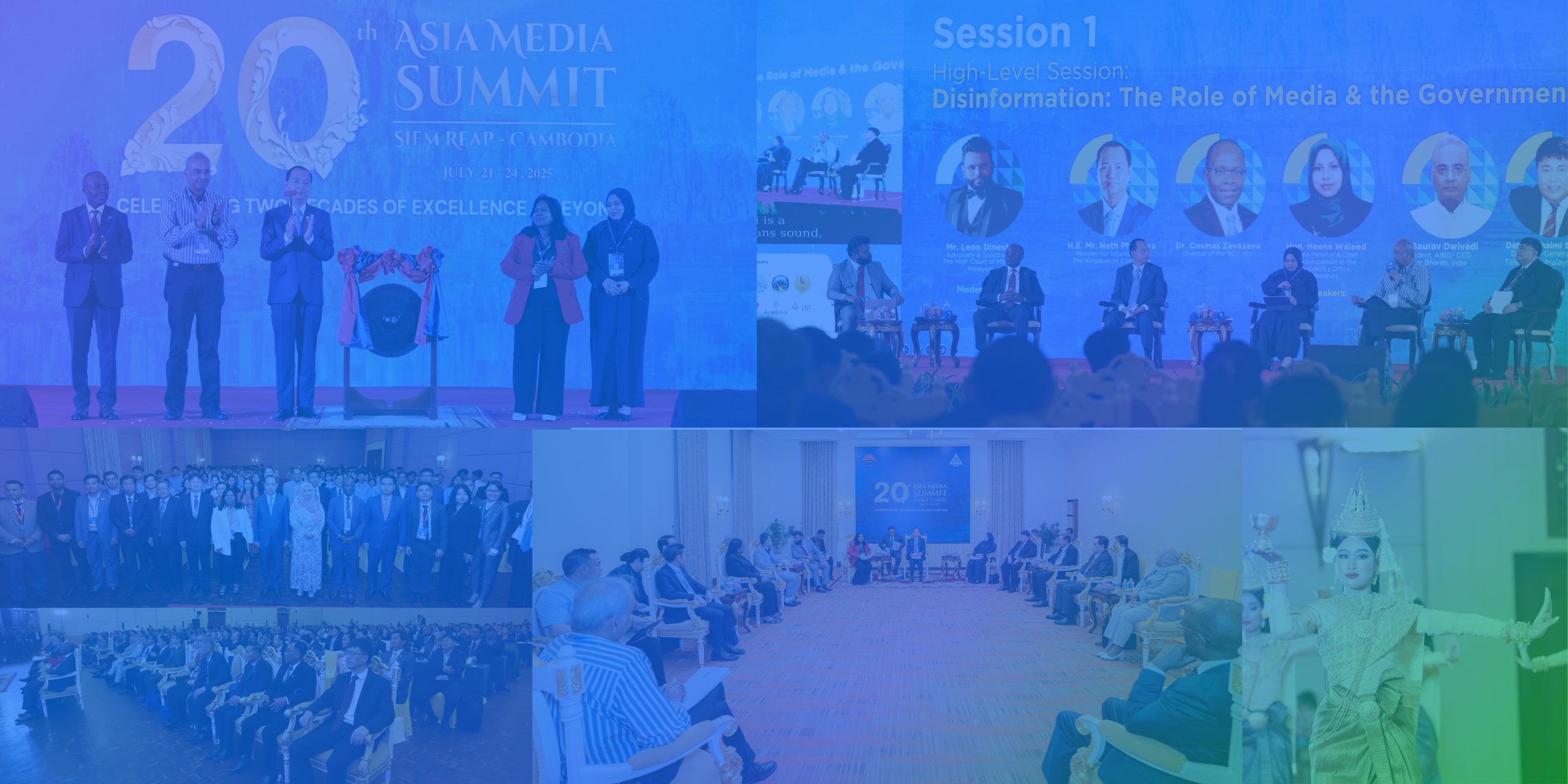Stellar Lineup of Speakers at AMS 2013
AMS 2013 Day One (29 May) offers an impressive mix of speakers from a variety of backgrounds, be in the broadcast industry, academia, NGO’s and other international organizations. Join us in this select gathering as we deliberate and debate on the most pressing issues facing the world of broadcasting!
AMS 2013 Day One (29 May) offers an impressive mix of speakers from a variety of backgrounds, be in the broadcast industry, academia, NGO’s and other international organizations. Join us in this select gathering as we deliberate and debate on the most pressing issues facing the world of broadcasting!
Plenary Session 1
Media and Diversity: The Way Forward
|
|
|
|
Chairperson
|
 Dr. Michael McCluskey
International Media and Broadcast Consultant, Australia
|
|
|
|
|
Speakers
|
 Dr. Aristides Katoppo
President Director, Sinar Harapan Persada, Indonesia
|
|
|
|
|
|
 Mrs. Usha Bhasin
Officer on Special Duty, Doordarshan (DD), India
|
|
|
|
|
|
 Mr. Salah Eddine Maaoui
Director General, Arab States Broadcasting Union (ASBU), Tunisia
|
|
|
|
|
|
 Mr. Yang Fuqing
Deputy Controller, China Central Television (CCTV), China
|
|
|
|
|
Parallel Session 1: Taking More Action for Sustainable Development: Can Media Help?
The recent United Nations Conference on Sustainable Development, more known as Rio+20 Earth Summit in 2012 has raised more concerns and expectations in dealing with an accelerating ecosystem degradation and increasing number of climate-induced extreme weather events. Compounding these problems are the global financial crisis, food and water scarcity, and volatile oil prices. As these multiple crises continue to become the dominant stories, can old and new media help build the capacity of a growing human population to live peacefully and sustainably on this planet? Can media urge governments and citizens to commit more strongly to a sustainable society?
|
|
|
|
|
Chairperson
|
 Mr. Murtaza Solangi Mr. Murtaza Solangi Former Director General, Pakistan Broadcasting Corporation (PBC), Pakistan
|
|
|
|
|
Speakers
|
 Mr. Parni Hadi Mr. Parni HadiFounder and Publisher, Dompet Dhuafa and former President Director of Radio Republik Indonesia (RRI), Indonesia
|
|
|
|
|
|
 Prof. Hubert Gijzen Prof. Hubert Gijzen Director, Regional Science Bureau for Asia and the Pacific, UNESCO
|
|
|
|
|
|
 Mr. Memafu Kapera Mr. Memafu KaperaManaging Director, National Broadcasting Corporation (NBC), Papua New Guinea
|
|
|
|
|
|
 Dr. Young-Woo Park Dr. Young-Woo ParkRegional Director and Representative for Asia and the Pacific, United Nations Environment Programme (UNEP)
|
|
|
|
|
|
 Dr. Salima Jan Dr. Salima JanResearch Scientist, Educational Multimedia Research Centre, University of Kashmir, India
|
|
Parallel Session 2: Media Literacy: Fulfilling Its Mandate
Initiatives on media literacy programs in order to gain critical autonomy relationship with all media in Asia-Pacific have been wanting. In some countries, media literacy in schools is subsumed in other subjects. Others emphasize acquiring production skills to help people understand, produce and negotiate meanings in a culture made up of powerful images, words and sounds. How can we promote and expand media literacy? Can we extend emphasis to other areas such as building an informed citizenship, aesthetic appreciation and expression, social advocacy, self-esteem, and consumer competence? What are some best media literacy practices?
|
|
|
|
|
Chairperson
|
 Mrs. Nathalie Labourdette Mrs. Nathalie LabourdetteHead, EUROVISION ACADEMY, Switzerland
|
|
|
|
|
Speakers
|
 Mr. Jose Maria G. Carlos Mr. Jose Maria G. CarlosAssociate Prof., Department of Media Studies, Faculty of Arts & Letters, University of Santo Tomas, Philippines
|
|
|
|
|
|
 Dato’ Adilah Shek Omar Dato’ Adilah Shek Omar Director, Tun Abdul Razak Institute of Broadcasting & Information (IPPTAR), Malaysia
|
|
|
|
|
|
 Prof. Dr. Laode M. Kamaluddin Prof. Dr. Laode M. KamaluddinPresident, Universitas Islam Sultan Agung (UNISSULA), Indonesia
|
|
|
|
|
|
 Dr. Murray Green Dr. Murray GreenMedia Development & Legal Policy Adviser, Australia
|
|
|
|
|
|
 Prof. Mohsen Banihashemi Prof. Mohsen BanihashemiDean, Faculty of Communication, Media University, Islamic Republic of Iran Broadcasting (IRIB), Iran
|
|
Plenary Session 2
|
|
|
Dealing with Ethics: Are Existing Models Effective?
As audiences become more demanding and discriminating, broadcast organizations will need to pursue a healthier mechanism to deal with ethical complaints and violations. Existing models include state regulation, self-regulation and co-regulation. Are they still valid and effective? Are codes of ethics making sense to promote professionalism? Do we need a more robust organization to enforce media ethics? Is there a role for the state in a self-regulatory system? What is a better alternative?
|
|
|
|
|
Moderator
|
 Associate Prof.Martin Hadlow Associate Prof.Martin Hadlow Secretary General,Asian Media Information and Communication Centre (AMIC), Singapore
|
|
|
|
|
Panelists
|
 Dr. Venkat Iyer Dr. Venkat Iyer Barrister & Media Law Consultant, University of Ulster, United Kingdom
|
|
|
|
|
|
 Ms. Moneeza Hashmi Ms. Moneeza HashmiPresident, Commonwealth Broadcasting Association (CBA) and General Manager, HUM TV, Pakistan
|
|
|
|
|
|
 Mr. Li Peichun Mr. Li PeichunDeputy Director, English Service, China Radio International (CRI), China
|
|
|
|
|
|
 Mrs. Soondaree Devi Soborun Mrs. Soondaree Devi Soborun Deputy Director General, Mauritius Broadcasting Corporation (MBC), Mauritius
|
|
|
|
|
|
 Mr. Vorasack Pravongviengkham Mr. Vorasack PravongviengkhamDeputy Director General, Lao National Radio(LNR), Laos
|





